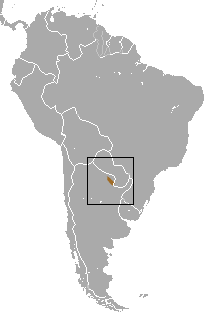Chacoan pygmy opossum facts for kids
Quick facts for kids Chacoan pygmy opossum |
|
|---|---|
| Conservation status | |
| Scientific classification |
|
| Kingdom: | Animalia |
| Phylum: | Chordata |
| Class: | Mammalia |
| Infraclass: | Marsupialia |
| Order: | Didelphimorphia |
| Family: | Didelphidae |
| Subfamily: | Didelphinae |
| Tribe: | Thylamyini |
| Genus: | Chacodelphys Voss et al., 2004 |
| Species: |
C. formosa
|
| Binomial name | |
| Chacodelphys formosa (Shamel, 1930)
|
|
 |
|
| Chacoan pygmy opossum range | |
| Script error: The function "autoWithCaption" does not exist. | |
Script error: No such module "Check for conflicting parameters".
The Chacoan pygmy opossum (Chacodelphys formosa) is a very small marsupial that was only recently discovered as a new type of animal. It is the only known species in its group, called Chacodelphys. For a long time, scientists only knew about this opossum from one animal found in 1920. This animal was discovered in a region called the Gran Chaco in Formosa Province, Argentina. Today, this tiny opossum is becoming popular as a pocket pet.
What Does It Look Like?
The Chacoan pygmy opossum is the smallest known type of didelphid, which is a family of opossums. It is truly tiny!
- Its head and body together are about 6.8 centimeters (2.7 inches) long.
- Its tail is about 5.5 centimeters (2.2 inches) long.
- Its back foot is only about 1.1 centimeters (0.4 inches) long.
This little opossum is special because of a few things. It has a long third finger on its hand. Unlike some other opossums, its fur is not clearly three different colors. It also has a long fourth toe on its foot. Plus, its tail is shorter than its head and body combined. No other small opossum has all these features together!
How It Got Its Name
The Chacoan pygmy opossum's scientific name, C. formosa, has changed a few times over the years.
- When it was first described in 1930 by a scientist named H. Harold Shamel, he called it Marmosa muscula.
- However, that name was already being used for another animal. So, Shamel quickly gave it a new name: M. formosa.
- Later, another scientist, George Henry Hamilton Tate, thought it belonged to a different group of opossums.
- For many years, scientists debated if it was a separate species or just a type of Marmosa or Thylamys.
- Finally, in 2004, a group of scientists led by Voss decided it was unique enough to have its very own group, or genus. They created the new genus Chacodelphys just for this species.
See also
- In Spanish: Marmosa pigmea del Chaco para niños
 | Charles R. Drew |
 | Benjamin Banneker |
 | Jane C. Wright |
 | Roger Arliner Young |


